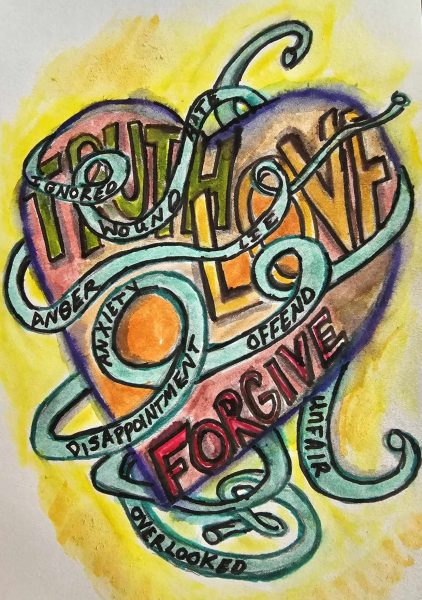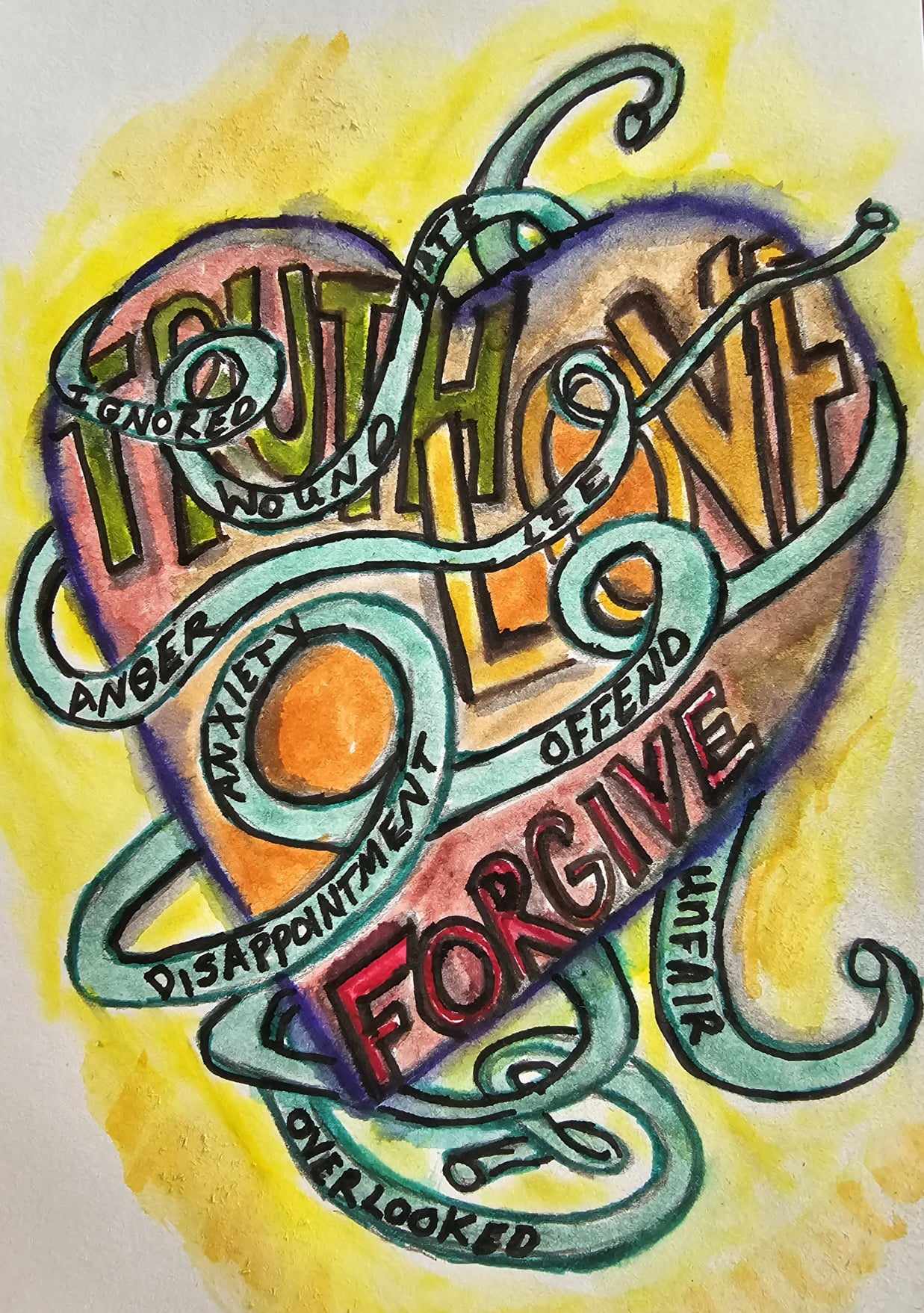Make allowance for each other’s faults, and forgive anyone who offends you. Remember, the Lord forgave you, so you must forgive others. Above all, clothe yourselves with love, which binds us all together in perfect harmony. Colossians 3:13-14 (NLT)
Then Peter came to him and asked, “Lord, how often should I forgive someone[a] who sins against me? Seven times?””No, not seven times,” Jesus replied, “but seventy times seven! Matthew 18:21-22 (NLT)
Instead, be kind to each other, tenderhearted, forgiving one another, just as God through Christ has forgiven you. Ephesians 4:32 (NLT)

“Lies Unraveled” watercolor by Amy J Heath
Forgiveness is more than an instant decision; it’s a process of acknowledging the pain, remembering God’s forgiveness to us, praying, and adjusting our attitudes. It’s like peeling back the layers of an onion to understand more deeply how to forgive as Jesus did. Forgiveness Unraveled–allowing God to peel back the layers of hurt, disappointment, and anger until the core of our being is exposed and healed from the deepest wounds that might inhibit us from walking in the complete freedom that forgiveness brings.
One of the reasons forgiveness is so challenging is that it seems unfair. When someone hurts you, forgiving them feels like letting them get away with something. You may want them to realize how bad their action was and feel regret to the same extent you felt pain. We also may delay offering forgiveness because we mistakenly believe that keeping our guard up will keep us from getting hurt again. In Romans 12:19, we read, Do not take revenge…but leave room for God’s wrath, for it is written: ‘It is mine to avenge; I will repay,’ says the Lord” (NIV). If we can applywhat God says about leaving retribution to Him, we can begin to move past a major obstacle in forgiving.
Many of us are familiar with the phrase Forgive and Forget. As a child, this concept was instilled in me –that you only truly forgive if you forget. So why would I ask for forgiveness when the situation was so painful that I couldn’t forget it? Knowing this, I desperately tried to forgive people, but I knew I had failed when I couldn’t forget the circumstances. Many years later, I attended a class on forgiveness and was then able to breathe a sigh of relief because the phrase forgive and forget is not found in the Bible. Forgiving someone does not mean denying the pain; it doesn’t excuse people from owning their mistakes and facing the consequences of their actions. It would also be unwise to restore trust when it could be unsafe. Instead, that experience can help us avoid situations where we may be repeatedly hurt.
However, after saying you forgive someone, what happens if you continue to hold a “grudge” against them because the pain is so deep? In Hebrews 12:14- 15, we are reminded to work on getting along with each other and with God. Otherwise, you’ll never get so much as a glimpse of God. Make sure no one gets left out of God’s generosity. Keep a sharp eye out for weeds of bitter discontent. A thistle or two gone to seed can ruin a whole garden in no time. I Corinthians 13:4-5 (NLT) reminds us that love keeps no record of wrongdoings: Love is patient, love is kind. It does not envy, it does not boast, it is not proud. It does not dishonor others, it is not self-seeking, it is not easily angered, it keeps no record of wrongs.
When we, with good intention, mouth the words, “I forgive,” but our hearts are still troubled, and we can’t discern why, be encouraged that forgiving deep hurts is most often a process. Such was my experience with forgiveness, where God gave me a deeper understanding of peeling back another layer of the onion to forgive, not just with my lips but from my heart. The church I had been attending for over 30 years had a change in pastors after our current pastor retired. It’s inevitable that when a pastor has been in a church for 23 years, many in the congregation have forged strong friendships with him. Due to these deep pastoral ties, some congregants might not be as enamored by the new pastor or his style, so choose to leave the church. A mass exodus is what happened at our church, and I experienced heartbreak as friends who had deep connections with my family left, resulting in severed relationships. I couldn’t understand why things were so chaotic—I loved our new pastor.
I became judgmental about why people left, and I harbored a lot of anger and bitterness. At one point, I cried out to God, “God, my heart is breaking for MY church; then the reminder came to me that it was HIS church, not MY church. to which I felt the need to ask God to forgive me for trying to take ownership of the church when He had it all along. So, once I got a better handle on things, I told God I forgave everyone who had left the church for whatever reason.
Shortly after, I went to a conference in Portland, Oregon, connected with Soul Formation (https://soulformation.org/), which let me pursue inner healing training. Just a quick synopsis of inner healing so everyone understands this: In Luke 4:18, Jesus declares that He is uniquely anointed to bring healing to the broken places in people’s hearts, to set captives free, and to lead prisoners to liberty. Jesus gives sight to the blind and brings restoration into people’s lives. “Inner healing” refers to an attempt to free people from the adverse emotional effects of past harmful experiences that may hinder their ability to feel loved and accepted. Often, the first step in this healing process is to address areas of unforgiveness.
After the first day of training, our assignment was to ask God where we lacked forgiveness in our hearts and to come back the next day ready to discuss what God had to say about who and what we needed to forgive. While driving to my hotel, I remember thinking about this, then grinning as I pompously said, “I’m not going to have anything to say. I’m good.” Because I believed I had forgiven all those who had left the church. Now, I can count on one hand the number of significant dreams I have had during my lifetime–most requiring interpretation by others—but, like God, that night, I had a dream!
While dreaming, I saw a file cabinet floating in space. Jesus had his hand on it. He invited me to open the top drawer. When I cautiously opened it, I saw individual file folders labeled with the names of those who had left the church. I reminded Jesus that I had forgiven them all several months earlier. But as I opened each folder, I read negative words I had spoken, along with specific dates, since the time I had “forgiven” them. Feeling crushed, I concluded that I had only given “head forgiveness”. God requires “heart forgiveness” as we allow him to peel back all the layers. I realized that the difference between head and heart forgiveness is that unconditional forgiveness only comes from the heart. And the awareness through the dream given to me by Jesus, that I had NOT forgiven the parishioners from my heart.
Let me interrupt the dream for a moment with a side note that explains how my heart was not transparent when I first mouthed the words, God, I forgive all those who left the church. In his book The Purpose-Driven Life, Rick Warren states, “If you hold on to the transgression like a trump card and play it every chance you get, you can be sure that unforgiveness is still present. This goes against Jesus’ command to forgive “seventy times seven”. After all, remember that God has forgiven you more times than you will ever have the opportunity to forgive someone else.
My dream concluded with a paper shredder appearing in the atmosphere, sucking in and shredding the negative words I had spoken. As the confetti from the ill-spoken words fell, it turned into beautiful jewels. The next morning, I walked forward to a cross at the front of the meeting room. I laid the cutting words that God had revealed to me, now written on paper, at the foot of the cross. A feeling of peace and freedom too intimate to describe overcame me.
I realized that as I allowed Jesus to peel back the layers of my deep wounds to expose the source of my bitterness and pain, I understood what it meant to forgive as He did. I no longer turned and walked in the other direction to avoid talking to a former parishioner I saw approaching me on the sidewalk, but instead, greeted them. Even if they posed questions about the church or why I was still there, I felt no offense, only love. Love and compassion had replaced anger, bitterness, and self-righteousness.
The song, A Heart That Forgives, by Kevin Levar so well depicts my story of forgiveness and the result of being able to let go of past hurts. He writes:
I want a heart that forgives
When the ones that are closest
That I’ve known the longest hurt me the most
I still want to love them just like You loved me
Even though I’m hurting
Cause the heart that forgives is the heart that will live
Totally free from the pain of the past
And the heart that lets go
Is the heart that will know so much freedom
To those who may be struggling with forgiveness, find peace and comfort in this song.

Joyce Olsen (Sonrise Magazine Editor) Author. Majored in Child Psychology and Elementary Education at Biola University and Fresno State University in California. However, her natural bent seemed to better match business and administration. In those fields, she worked in corporate administration, church administration, and also as an Information Security Analyst in the medical field. The focus of her writing is to inspire and provoke thought.

Leave a Reply